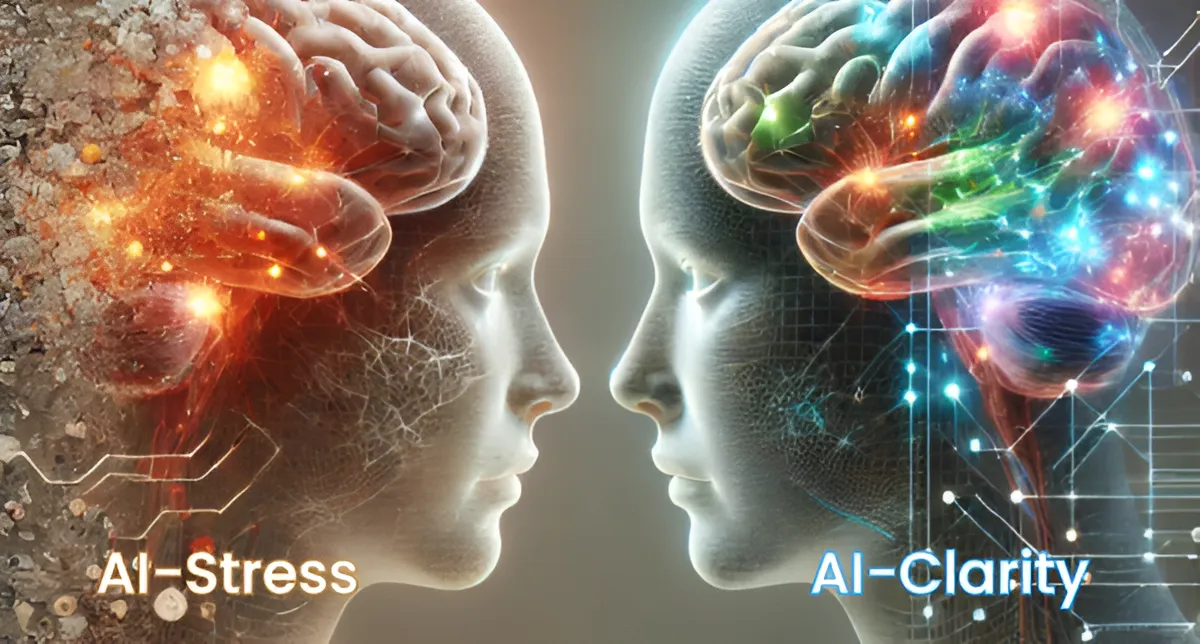
Is AI Stressing You Out? Here's How Neuroscience Can Help
AI isn't just stealing headlines — it's stealing your mental health, too. As artificial intelligence accelerates into our lives, the excitement of innovation often comes paired with a gnawing anxiety. Whether you're an executive worried about your competitive edge, a leader struggling to keep your team resilient, or an individual overwhelmed by rapid technological changes, AI-induced stress is real. But there's good news: neuroscience offers powerful insights and tools to manage stress and turn uncertainty into opportunity.
What Exactly is the Stress Quotient?
Developed by Rick Bowers and Dr. Ron Bonnstetter, the Stress Quotient is a powerful neuroscience-based diagnostic tool designed to help you pinpoint precisely how stress affects you, your team, and your entire organization. It measures stress across seven core categories, providing clarity and actionable insight into stress management.
Why does this matter more than ever now? AI-induced disruptions create a perfect storm for stress. New technologies reshape job descriptions overnight, challenge competitive advantages, and force constant adaptation. The result? Anxiety, uncertainty, and decreased productivity.
Turning Stress into Strategic Advantage
Understanding your Stress Quotient isn't just about diagnosing stress —I t's about transforming stress into strategic insight. Leaders and teams with this self-awareness become agile, resilient, and proactive.
In my book, Brain Science For The Soul, I emphasize that recognizing stress patterns is the crucial first step toward change. Neuroscience reveals that once stress triggers are identified and understood, the brain shifts from a reactive to a proactive state. You move from simply coping to strategically adapting.
Practical Steps to Manage AI-induced Stress
Here are three practical steps you can take right now:
1. Measure and Acknowledge Stress
Take the Stress Quotient assessment. Recognizing the root cause of your stress impacts you, or your team, empowering you. It shifts your mindset from vague worry to focused action.
2. Normalize Open Conversations About AI and Anxiety
Create safe spaces within your organization for open dialogue about AI-related concerns. Stress diminishes significantly when individuals feel understood, heard, and supported.
3. Equip Leaders and Teams with Neuroscience-Based Techniques
Stress Quotient assessments paired with Emotional Intelligence training and brain science tools can dramatically improve how you and your organization manage the inevitable uncertainty of AI-driven change.
Embracing a Future-Ready Mindset
As AI continues its march forward, your ability to manage stress and harness neuroscience will be critical—not just for your survival but for your thriving. Understanding your Stress Quotient prepares you and your organization to face change confidently, shifting from fear-driven reactions to purposeful, future-ready strategies.
In honor of Stress Awareness Month this April, I'm offering a special 40% discount on the Stress Quotient assessment. It's the perfect opportunity to take control, reduce anxiety, and prepare yourself and your organization for the future of work and life.
Discover Your Stress Quotient Now →
References
Bowers, R., & Bonnstetter, R. (2014). Stress Quotient Diagnostic Assessment. TTI Success Insights. Retrieved from https://blog.ttisi.com/stress-quotient-what-you-need-to-know
Entrepreneur.com. (2024). Generative AI Adoption Is Tearing Companies Apart, Survey Finds. Retrieved from https://www.entrepreneur.com/business-news/generative-ai-adoption-is-tearing-companies-apart-survey/488686
Vela, A. (2023). Brain Science For The Soul. MarketTecNexus Press.
Workplace Intelligence & Writer (2024). Generative AI Adoption & Workplace Impact Survey Report. Workplace Intelligence.
About Adriana Vela
Adriana Vela is a best-selling author and CEO of MarketTecNexus, a consulting practice that helps companies scale their businesses with AI Business Scale Up™ solutions, which include AI business systems, business process engineering, NeuroAI implementation, and data management, among others. Named one of the “10 Most Empowering Women Leaders of 2021”, she is a multiple award-winning entrepreneur, an AI strategist, and a certified business and brain science leadership and performance optimization coach. She is the creator of the Human-First Performance Systems™ and the Coaching-as-a-Benefit™ system.
